PEUGEOT 2008 2015 Owners Manual
Manufacturer: PEUGEOT, Model Year: 2015, Model line: 2008, Model: PEUGEOT 2008 2015Pages: 340, PDF Size: 8.4 MB
Page 181 of 340
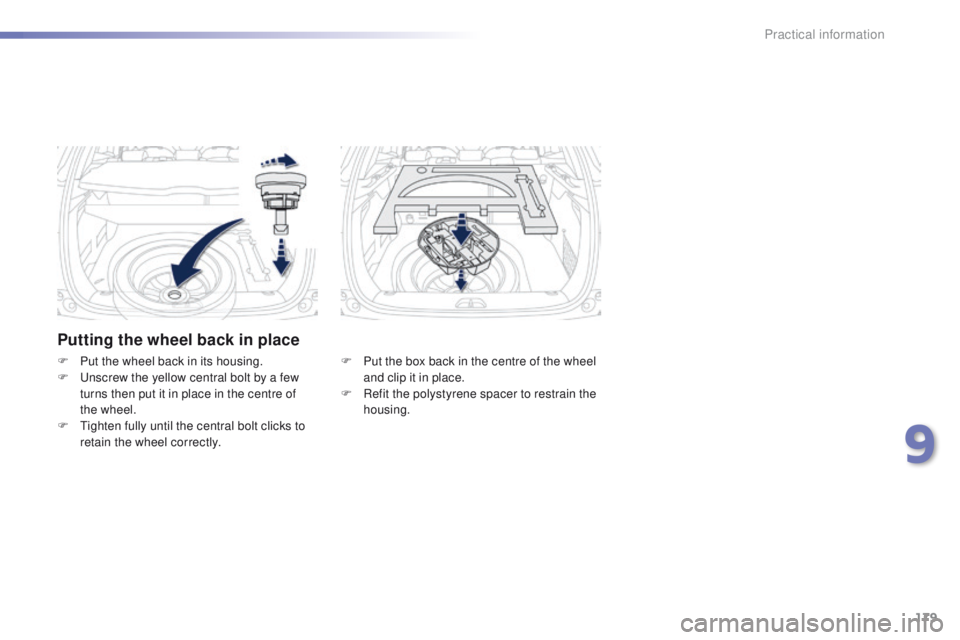
179
2008_en_Chap09_info-pratiques_ed01-2015
Putting the wheel back in place
F Put the box back in the centre of the wheel and clip it in place.
F
R
efit the polystyrene spacer to restrain the
housing.
F
P
ut the wheel back in its housing.
F
U
nscrew the yellow central bolt by a few
turns then put it in place in the centre of
the
wheel.
F
T
ighten fully until the central bolt clicks to
retain the wheel correctly.
9
Practical information
Page 182 of 340
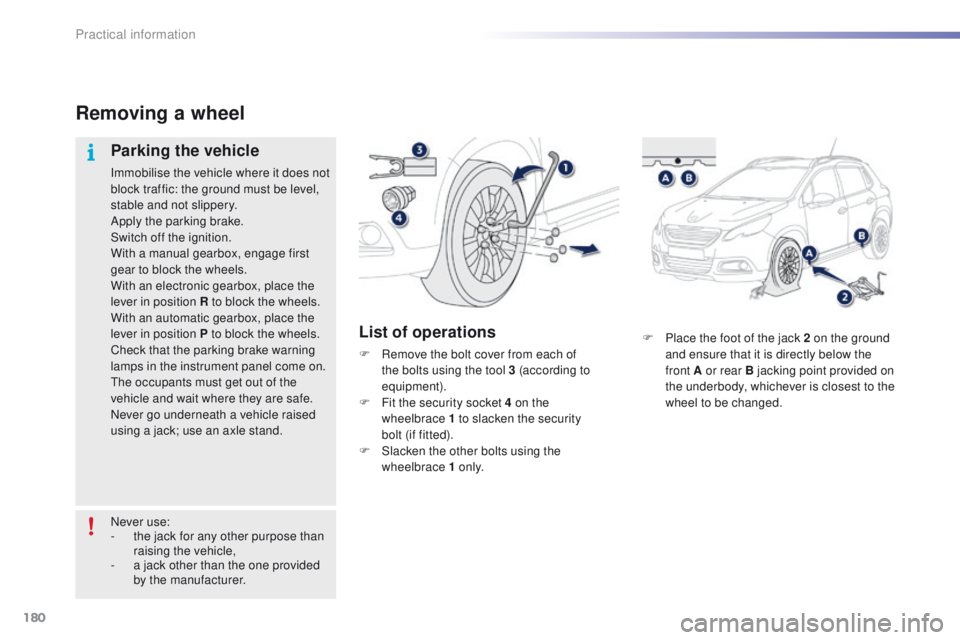
180
2008_en_Chap09_info-pratiques_ed01-2015
F Place the foot of the jack 2 on the ground and ensure that it is directly below the
front
A or rear B jacking point provided on
the underbody, whichever is closest to the
wheel to be changed.
Removing a wheel
Parking the vehicle
Immobilise the vehicle where it does not
block traffic: the ground must be level,
stable and not slippery.
Apply the parking brake.
Switch off the ignition.
With a manual gearbox, engage first
gear to block the wheels.
With an electronic gearbox, place the
lever in position R to block the wheels.
With an automatic gearbox, place the
lever in position P to block the wheels.
Check that the parking brake warning
lamps in the instrument panel come on.
The occupants must get out of the
vehicle and wait where they are safe.
Never go underneath a vehicle raised
using a jack; use an axle stand.
List of operations
F Remove the bolt cover from each of the bolts using the tool 3 (according to
equipment).
F
F
it the security socket 4 on the
wheelbrace
1 to slacken the security
bolt (if fitted).
F
S
lacken the other bolts using the
wheelbrace 1 o n l y.
Never use:
-
t
he jack for any other purpose than
raising the vehicle,
-
a j
ack other than the one provided
by the manufacturer.
Practical information
Page 183 of 340
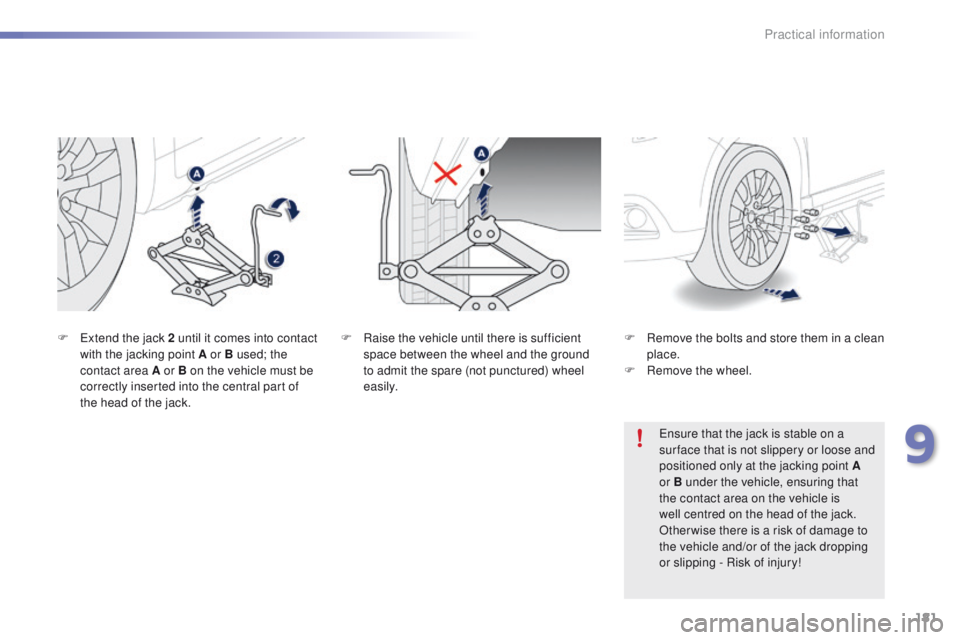
181
2008_en_Chap09_info-pratiques_ed01-2015
F Raise the vehicle until there is sufficient space between the wheel and the ground
to admit the spare (not punctured) wheel
easily.
F
E
xtend the jack 2 until it comes into contact
with the jacking point A or B used; the
contact area A or B on the vehicle must be
correctly inserted into the central part of
the head of the jack.
Ensure that the jack is stable on a
sur face that is not slippery or loose and
positioned only at the jacking point
A
or B under the vehicle, ensuring that
the contact area on the vehicle is
well centred on the head of the jack.
Otherwise there is a risk of damage to
the vehicle and/or of the jack dropping
or slipping - Risk of injury!
F
R emove the bolts and store them in a clean
place.
F
R
emove the wheel.
9
Practical information
Page 184 of 340
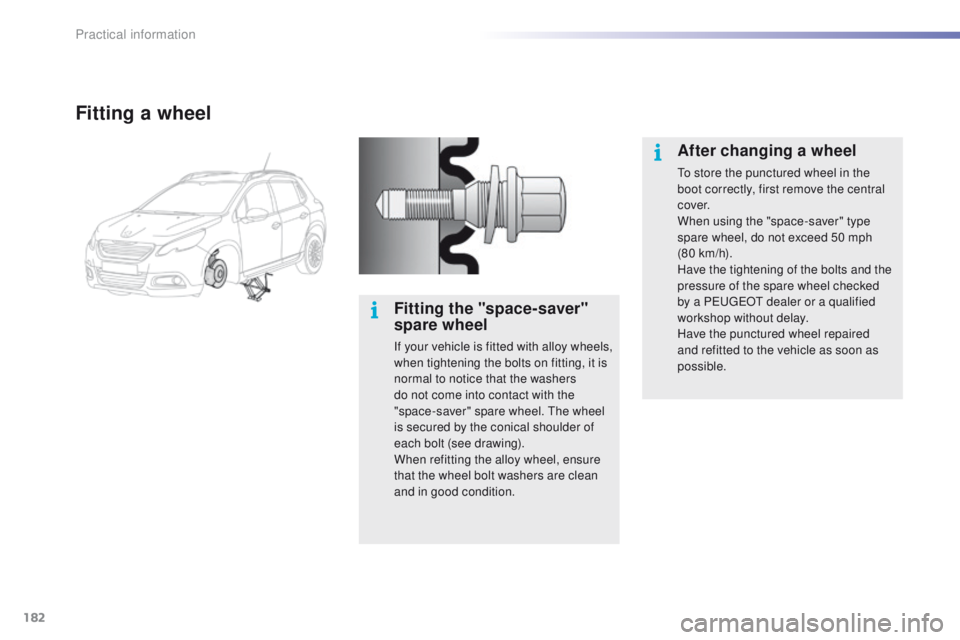
182
2008_en_Chap09_info-pratiques_ed01-2015
Fitting a wheel
Fitting the "space-saver"
spare wheel
If your vehicle is fitted with alloy wheels,
when tightening the bolts on fitting, it is
normal to notice that the washers
do not come into contact with the
"space-saver" spare wheel. The wheel
is secured by the conical shoulder of
each bolt (see drawing).
When refitting the alloy wheel, ensure
that the wheel bolt washers are clean
and in good condition.
After changing a wheel
To store the punctured wheel in the
boot correctly, first remove the central
c ove r.
When using the "space-saver" type
spare wheel, do not exceed 50 mph
(80 km/h).
Have the tightening of the bolts and the
pressure of the spare wheel checked
by a PEUGEOT dealer or a qualified
workshop without delay.
Have the punctured wheel repaired
and refitted to the vehicle as soon as
possible.
Practical information
Page 185 of 340
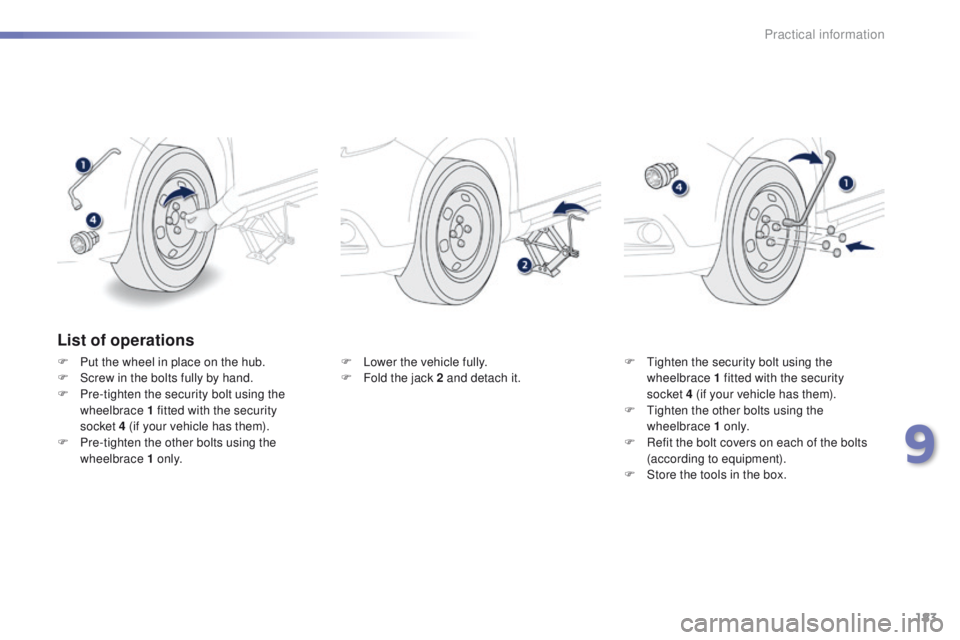
183
2008_en_Chap09_info-pratiques_ed01-2015
List of operations
F Put the wheel in place on the hub.
F S crew in the bolts fully by hand.
F
P
re-tighten the security bolt using the
wheelbrace 1 fitted with the security
socket
4 (if your vehicle has them).
F
P
re-tighten the other bolts using the
wheelbrace 1 o n l y. F
L ower the vehicle fully.
F F old the jack 2 and detach it.F
T ighten the security bolt using the
wheelbrace 1 fitted with the security
socket
4 (if your vehicle has them).
F
T
ighten the other bolts using the
wheelbrace 1 o n l y.
F
R
efit the bolt covers on each of the bolts
(according to equipment).
F
S
tore the tools in the box.
9
Practical information
Page 186 of 340
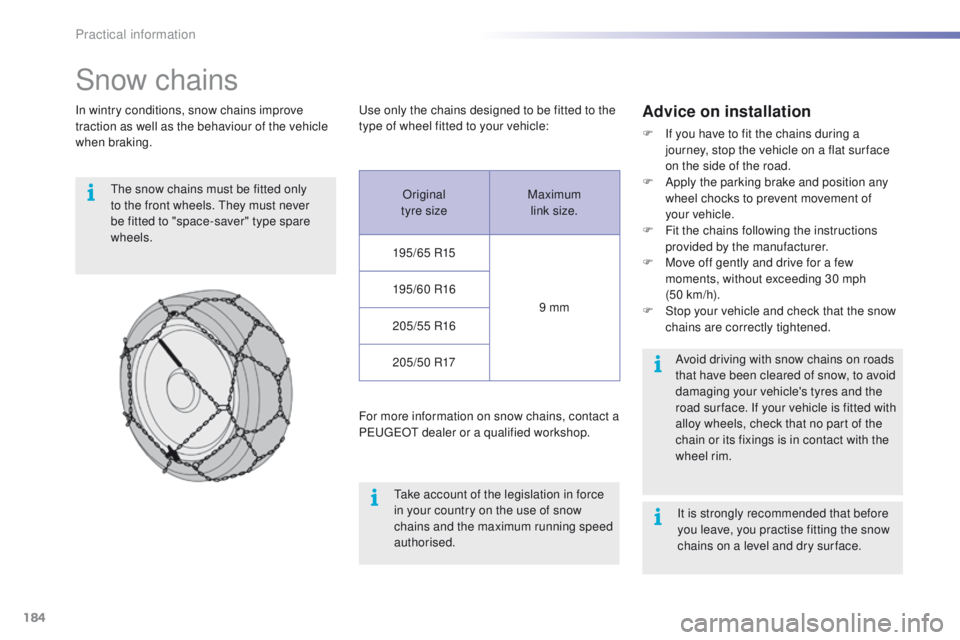
184
2008_en_Chap09_info-pratiques_ed01-2015
Snow chains
In wintry conditions, snow chains improve
traction as well as the behaviour of the vehicle
when braking.The snow chains must be fitted only
to the front wheels. They must never
be fitted to "space-saver" type spare
wheels.
Take account of the legislation in force
in your country on the use of snow
chains and the maximum running speed
authorised.
Use only the chains designed to be fitted to the
type of wheel fitted to your vehicle:
For more information on snow chains, contact a
PEUGEOT dealer or a qualified workshop.Advice on installation
F If you have to fit the chains during a
journey, stop the vehicle on a flat sur face
on the side of the road.
F
A
pply the parking brake and position any
wheel chocks to prevent movement of
your
vehicle.
F
F
it the chains following the instructions
provided by the manufacturer.
F
M
ove off gently and drive for a few
moments, without exceeding 30 mph
(50 km/h).
F
S
top your vehicle and check that the snow
chains are correctly tightened.
Avoid driving with snow chains on roads
that have been cleared of snow, to avoid
damaging your vehicle's tyres and the
road sur face. If your vehicle is fitted with
alloy wheels, check that no part of the
chain or its fixings is in contact with the
wheel rim.
Original
tyre size Maximum
link size.
195/65 R15
9 mm
195/60 R16
205/55 R16 205/50 R17
It is strongly recommended that before
you leave, you practise fitting the snow
chains on a level and dry sur face.
Practical information
Page 187 of 340
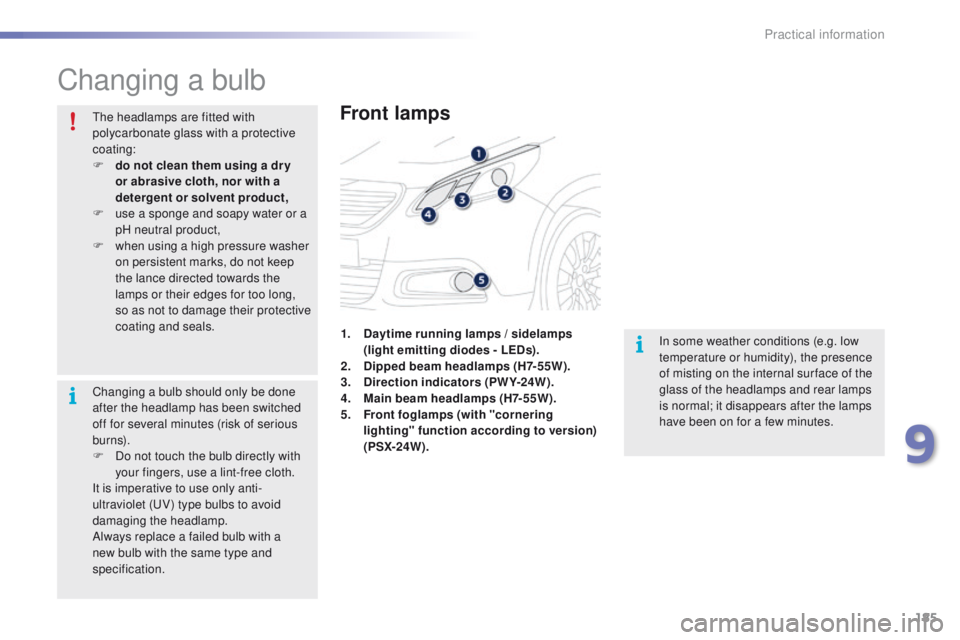
185
2008_en_Chap09_info-pratiques_ed01-2015
Changing a bulb
Front lamps
In some weather conditions (e.g. low
temperature or humidity), the presence
of misting on the internal sur face of the
glass of the headlamps and rear lamps
is normal; it disappears after the lamps
have been on for a few minutes.
The headlamps are fitted with
polycarbonate glass with a protective
coating:
F
d
o not clean them using a dr y
or abrasive cloth, nor with a
detergent or solvent product,
F
u
se a sponge and soapy water or a
pH neutral product,
F
w
hen using a high pressure washer
on persistent marks, do not keep
the lance directed towards the
lamps or their edges for too long,
so as not to damage their protective
coating and seals. 1. D
aytime running lamps / sidelamps
(light emitting diodes - LEDs).
2.
D
ipped beam headlamps (H7-55W).
3.
D
irection indicators (PWY-24W).
4.
M
ain beam headlamps (H7-55W).
5.
F
ront foglamps (with "cornering
lighting" function according to version)
(PSX-24W).
Changing a bulb should only be done
after the headlamp has been switched
off for several minutes (risk of serious
burns).
F
D
o not touch the bulb directly with
your fingers, use a lint-free cloth.
It is imperative to use only anti-
ultraviolet (UV) type bulbs to avoid
damaging the headlamp.
Always replace a failed bulb with a
new bulb with the same type and
specification.
9
Practical information
Page 188 of 340
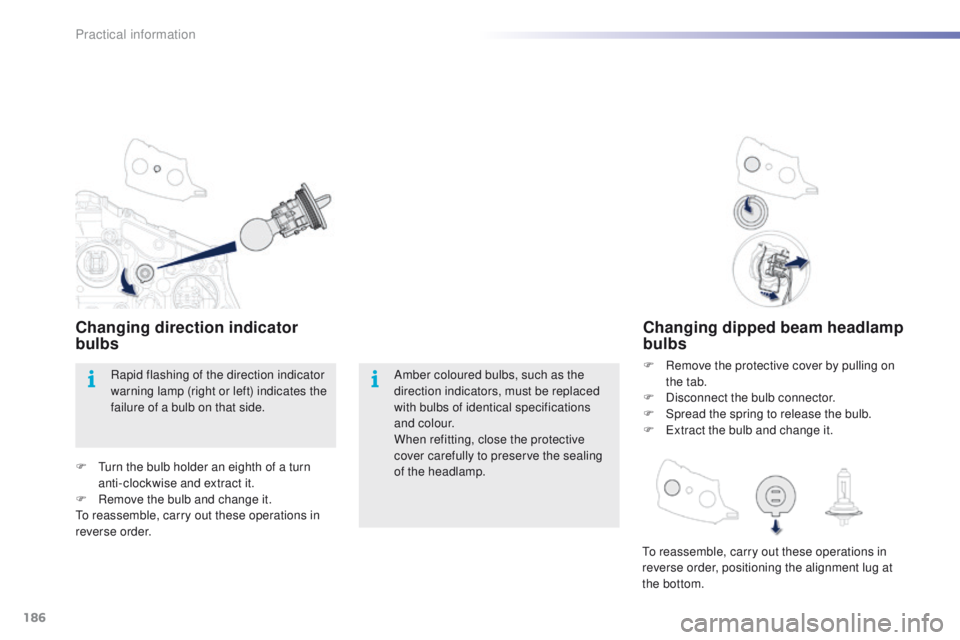
186
2008_en_Chap09_info-pratiques_ed01-2015
Changing dipped beam headlamp
bulbs
F Remove the protective cover by pulling on the tab.
F
D
isconnect the bulb connector.
F
S
pread the spring to release the bulb.
F
E
xtract the bulb and change it.
Amber coloured bulbs, such as the
direction indicators, must be replaced
with bulbs of identical specifications
and colour.
When refitting, close the protective
cover carefully to preserve the sealing
of the headlamp.
Rapid flashing of the direction indicator
warning lamp (right or left) indicates the
failure of a bulb on that side.
Changing direction indicator
bulbs
To reassemble, carry out these operations in
reverse order, positioning the alignment lug at
the bottom.
F
T
urn the bulb holder an eighth of a turn
anti-clockwise and extract it.
F
R
emove the bulb and change it.
To reassemble, carry out these operations in
reverse order.
Practical information
Page 189 of 340
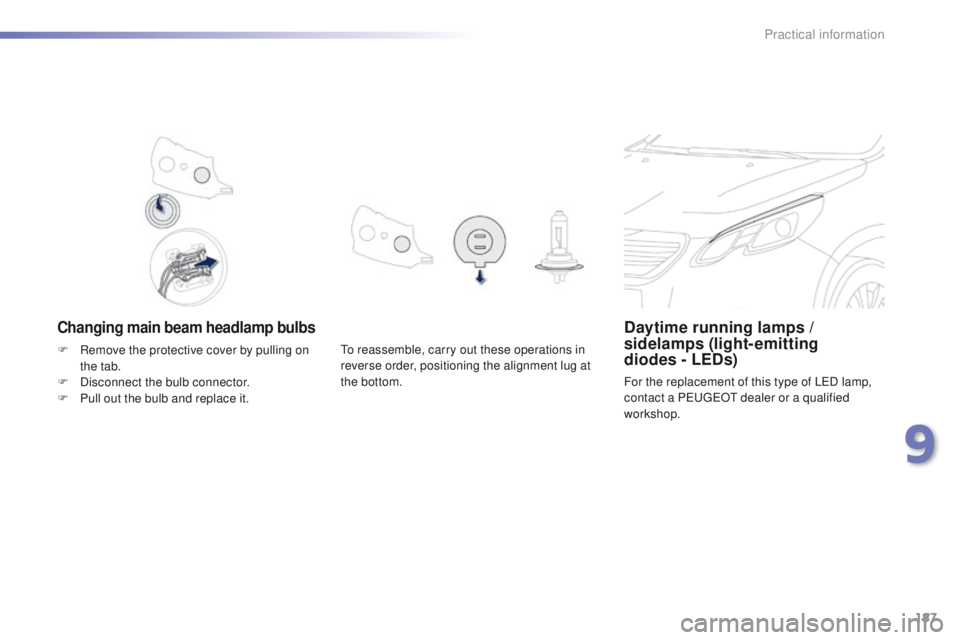
187
2008_en_Chap09_info-pratiques_ed01-2015
Changing main beam headlamp bulbsDaytime running lamps /
sidelamps (light-emitting
diodes - LEDs)
For the replacement of this type of LED lamp,
contact a PEUGEOT dealer or a qualified
workshop.
To reassemble, carry out these operations in
reverse order, positioning the alignment lug at
the bottom.
F
R
emove the protective cover by pulling on
the tab.
F
D
isconnect the bulb connector.
F
P
ull out the bulb and replace it.
9
Practical information
Page 190 of 340
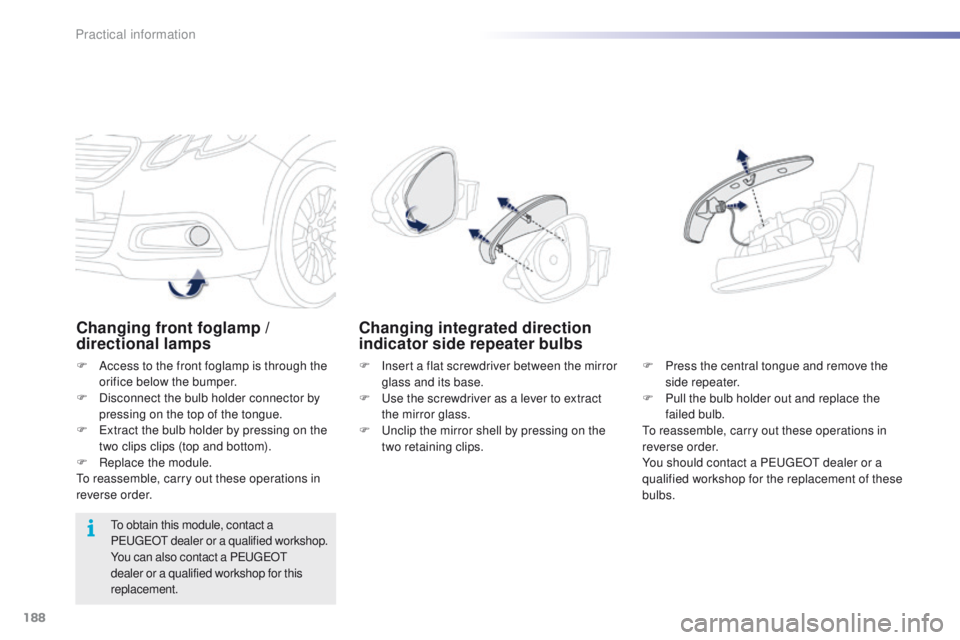
188
2008_en_Chap09_info-pratiques_ed01-2015
Changing front foglamp /
directional lamps
F Access to the front foglamp is through the orifice below the bumper.
F
D
isconnect the bulb holder connector by
pressing on the top of the tongue.
F
E
xtract the bulb holder by pressing on the
two clips clips (top and bottom).
F
R
eplace the module.
To reassemble, carry out these operations in
reverse order.
Changing integrated direction
indicator side repeater bulbs
F Press the central tongue and remove the side repeater.
F
P
ull the bulb holder out and replace the
failed bulb.
To reassemble, carry out these operations in
reverse order.
You should contact a PEUGEOT dealer or a
qualified workshop for the replacement of these
bulbs.
F
I
nsert a flat screwdriver between the mirror
glass and its base.
F
U
se the screwdriver as a lever to extract
the mirror glass.
F
U
nclip the mirror shell by pressing on the
two retaining clips.
To obtain this module, contact a
PEUGEOT dealer or a qualified workshop.
You can also contact a PEUGEOT
dealer or a qualified workshop for this
replacement.
Practical information